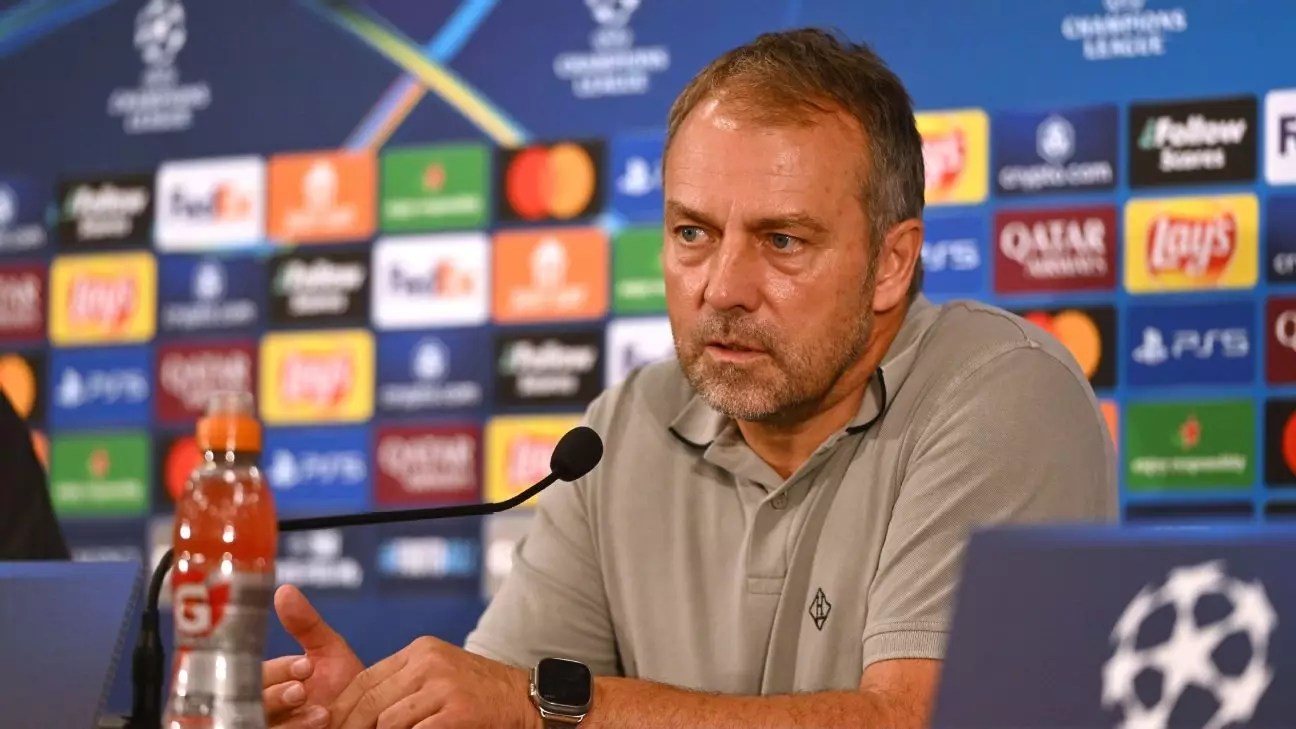As the intensity of the football season ramps up, FC Barcelona finds itself at a crucial juncture under the guidance of coach Hansi Flick. With a string of injuries and the demanding fixture load of both domestic and European competitions, Flick’s assertion that his squad can handle the heat will be put to the test. His proclamation of “no excuses” serves as a rallying cry for his team, yet the reality remains that the physical strain of competing at the highest level can take a significant toll on players, both mentally and physically.
The early season saw Barcelona cruising with five consecutive wins in La Liga, providing a false sense of security. However, the recent defeat against AS Monaco in the Champions League highlighted vulnerabilities in the squad. Flick acknowledges the looming challenge of facing Villarreal—a side that has proven to be resilient thus far—under the burden of fatigue and injury. With matches piling up every few days, the effectiveness of squad rotation and management becomes imperative, especially as Barcelona’s roster remains relatively short.
The lengthy injury list plaguing the team looms large over Barcelona’s aspirations this season. Holding out hope for returning players such as Ronald Araújo and Frenkie de Jong could provide a much-needed boost, yet the trappings of injury typically lead to a downturn in team performance. The mix of young talents and experienced contributors losing time on the pitch presents a complicated dynamic. Flick’s insistence that he focuses on those available for selection is commendable, but ignoring the profound impact of missing key players is a precarious stance.
The inconsistency in player availability directly influences team chemistry. Fresh legs might offer a temporary reprieve, yet the integration of substitutes into the game requires time and understanding, something that cannot be hurried in professional football. In contests against established opponents like Villarreal, who have remained undefeated, Barcelona’s ability to form cohesive plays and exploit spaces on the field will mandate a united approach. Flick’s tactical acumen will be tested as he strives to instill confidence within a patched-up side.
Amid the grueling demands of the football calendar, voices from the football community—most notably, that of Manchester City midfielder Rodri—are echoing a call for reform. The fatigue players experience, especially within top clubs, raises the question of sustainability. Flick’s support for adapting the schedule suggests that the current format may be unsustainable if the sport aims to preserve its quality and prevent the burnout of its athletes.
With calls for change resonating from both athletes and coaches alike, UEFA and FIFA must navigate a complicated terrain where competitive integrity, player health, and fan expectations intertwine. The balance of delivering thrilling football while ensuring the welfare of players forms a core challenge in modern-day sports governance. As the industry shifts, it would be prudent to reevaluate fixture congestion and its repercussions on the health of players.
Despite the challenges facing Barcelona, Flick remains optimistic about cultivating a resilient mindset among the players. His commitment to developing a strong mental approach on the pitch is critical. He views training sessions as a crucial component of maintaining team morale, ensuring that performance standards do not diminish as fatigue sets in. Flick highlights his intention to visualize tactical formations and game plans that facilitate not only victory but instill self-confidence within the squad.
Furthermore, the undercurrent of leadership from players like Marc-André ter Stegen becomes crucial, especially when they face unwarranted criticism. Support for ter Stegen, whose short pass in the Monaco match led to an early dismissal, emphasizes the importance of learning from mistakes, fostering a culture where accountability for errors leads to growth. Flick’s emphasis on a holistic approach to team dynamics may mesh well with the ethos of Spanish football, where fluid playing styles take precedence.
As Barcelona prepares for the upcoming matches, the pressing task for Flick and his players is to embrace adaptability. While challenges abound with injuries and a congested schedule, the concept of resilience can define their campaign. By shifting focus from uncontrollable factors—like injuries and the schedule—to maximizing the contributions of those available, the mentality going into tough fixtures can serve as a catalyst for success. The balance of risk and reward adeptly showcased in previous La Liga games can provide the foundation needed to navigate an unpredictable season.
As the season progresses, the ultimate test will not just revolve around winning matches, but also in nurturing the team’s development. How Flick manages these elements will determine not only Barcelona’s immediate success but their capacity to instill lasting growth in a turbulent footballing landscape.


Leave a Reply